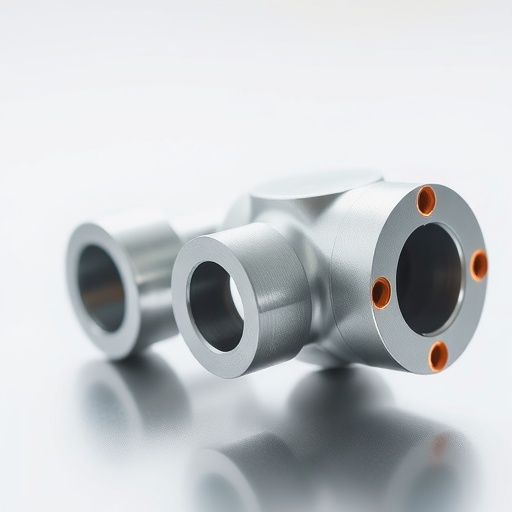In a groundbreaking study by Deng, Yang, and Hu, published in the esteemed journal “Ionics,” the researchers delve into the selection of industrial aluminum alloys and their performance under both high and low temperature conditions in the context of aluminum-air batteries. This research not only illuminates the potential of aluminum-air batteries as a cleaner energy alternative, but also highlights the critical role that material selection plays in optimizing their performance.
Aluminum-air batteries have garnered significant attention due to their high energy density and potential for long-lasting power sources. Unlike conventional batteries that rely on heavy metals or toxic materials, aluminum-air batteries utilize aluminum as an anode, providing an eco-friendly alternative to traditional battery technology. The inherent sustainability of aluminum, along with its abundance in the Earth’s crust, positions it as a promising candidate for future energy solutions. However, as the study reveals, the performance of these batteries can be significantly influenced by the choice of alloy used in their construction.
One of the critical insights from the study indicates that the high corrosion resistance and mechanical properties of selected aluminum alloys enhance the operational efficiency of aluminum-air batteries. The research emphasizes the importance of understanding the electrochemical dynamics that take place within these alloys when subjected to various temperature ranges. It becomes clear that temperature plays a pivotal role not only in battery efficiency but also in the longevity and reliability of aluminum-air battery systems.
In their detailed analysis, the researchers explore a variety of aluminum alloys, each with unique compositions and properties. This exploration includes examining both the physical and chemical behaviors of these alloys under high-temperature conditions, where batteries often face challenges such as accelerated degradation and diminished performance. The findings point toward specific aluminum alloys that maintain their structural integrity and functionality, thereby addressing one of the main concerns regarding temperature effects on battery performance.
Conversely, the study also addresses the low-temperature performance of aluminum-air batteries, revealing significant insights into how certain alloys perform under frigid conditions. Battery efficiency typically plummets at low temperatures, a hurdle that could hinder the widespread adoption of aluminum-air technology in colder climates. By investigating the microstructural responses of various aluminum alloys to low temperatures, the researchers identify potential modifications that could enhance performance stability in such environments.
The implications of this research extend beyond mere battery efficiency; they touch upon broader themes within the renewable energy sector. As industries strive to meet global carbon reduction goals, the enhancement of aluminum-air battery technology could offer a sustainable power solution for electric vehicles, renewable energy storage systems, and other applications. The ability of aluminum-air batteries to operate efficiently in diverse environmental conditions positions them as a frontrunner in the push for greener energy alternatives.
Furthermore, the study underlines the necessity for ongoing research into the long-term viability of aluminum-air systems. While the current findings are promising, understanding the long-term impacts of battery usage on aluminum alloys continues to raise critical questions. Researchers will need to consider the aging processes of these systems, including how factors such as humidity and exposure to diverse atmospheric conditions may affect alloy performance over time.
In sum, the research led by Deng and colleagues sheds light on the complex interplay between material selection, temperature conditions, and battery performance. By enhancing our understanding of aluminum alloys in the context of aluminum-air batteries, this study opens new avenues for innovations in energy storage technologies. As we move into an era where sustainable energy solutions are critically needed, the insights from this research could pave the way for significant advancements in the field.
In conclusion, the work conducted by Deng, Yang, and Hu represents a significant contribution not only to the field of materials science but also to the future of energy storage technology. The findings call for further exploration into industrial aluminum alloys, emphasizing their role in maximizing the efficiency and sustainability of aluminum-air batteries. With the right material innovations and technological advancements, the dream of a cleaner, greener energy future may be just around the corner.
This study exemplifies the kind of collaborative research that is essential in today’s multidisciplinary scientific landscape. Incorporating perspectives from materials science, electrochemistry, and energy technology, this research highlights the value of integrating diverse scientific disciplines in order to tackle complex global challenges. It serves as a model for future inquiries into high-performance battery technologies that are not only effective but also environmentally friendly.
Subject of Research: Selection of industrial aluminum alloy and study on high and low temperature performance of aluminum air battery.
Article Title: Selection of industrial aluminum alloy and study on high and low temperature performance of aluminum air battery.
Article References:
Deng, J., Yang, W., Hu, X. et al. Selection of industrial aluminum alloy and study on high and low temperature performance of aluminum air battery.
Ionics (2025). https://doi.org/10.1007/s11581-025-06865-2
Image Credits: AI Generated
DOI:
Keywords: Aluminum-air battery, industrial aluminum alloy, high temperature performance, low temperature performance, energy storage technology.




